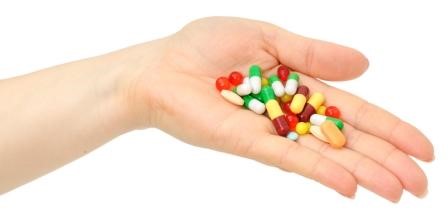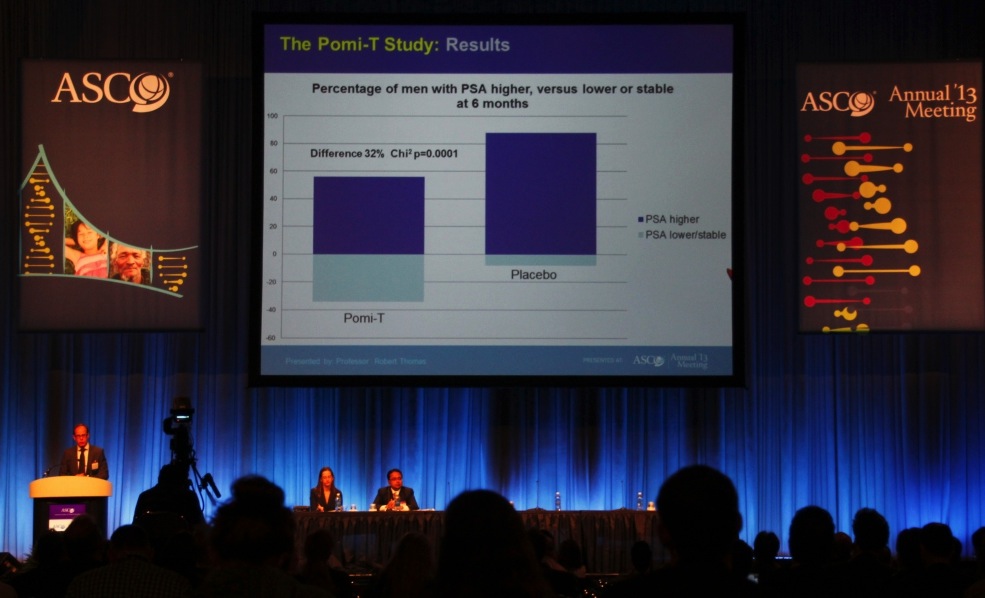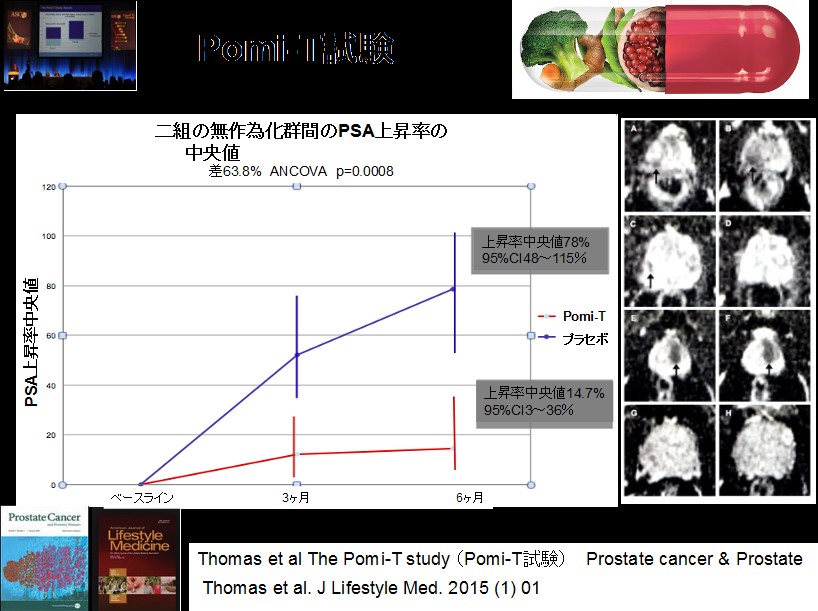ポリフェノールが豊富な食事が健康にいいとされる証拠は?
健康的な食品に含まれる自然植物由来のファイトケミカルであるポリフェノールが豊富な食事は認知症、高コレステロール、関節炎、心臓病、肌の老化、黄斑変性症などの慢性疾患のリスクをさげるとされています[Denny, Elments, Karppi, Rezai-Zadeh, Porrini]
きちんと運営された集団研究では、定期的な摂取が乳がん[Hu]、すい臓がん[Banim]、食道がん[Sun]、卵巣がん[Wu, Tung]、前立腺がん[Giovannucci, Chaoyang, Joseph]、皮膚がん[Heinen]など多くのがんのリスクを下げるとしています。
ポリフェノールの抗がん効果はがんと診断された後でも有効です。乳がんの生存者でポリフェノールが多く含まれた果物、野菜、ダイズや緑茶を摂っていた人達は再発率が低いことがわかっています[Pierce, Buck, Boyapati, Ogunleye]。
皮膚がん患者で葉物野菜やブロッコリーを多く摂取した人は新しいがんの形成率が低かった例もあります[Heinen]。ポリフェノールが豊富な食事を含めた健康的なライフスタイルが無痛性前立腺がんのPSA進行の速度を抑えることにつながっています[Ornish]。
毎日のサプリメントで食生活を後押しすることががんのリスクやがんの進行を抑えるという証拠はありますか?
食品サプリメントは二つのカテゴリーに分けることができます。食品から化学物質をエキスにし濃縮して錠剤にしたものと、選りすぐりの自然食品そのものを濃縮したものです。
抽出した化学物質を含むサプリメント
多くのサプリメントがこのカテゴリーにあたり、ビタミンやミネラルが含まれており、リコピン、ノコギリヤシ、ゲニステインなどの抽出ポリフェノールが含まれているものもあります。
ビタミンやミネラル不足の食事が、がんのリスクや再発率に大きな影響を与えるデータがあるにも係らず[Chaoyang, Reichman, Leitzmann, Rock, Shenk]、多くの研究はビタミンやミネラルのサプリメントは効果がない、もしくはがんのリスクを若干上げるとしています。

最も注意すべきなのはSELECTの研究でビタミンEとセレンのサプリメントを摂取後に前立腺がんの発生率が上がった[Klein]、CARETとATBCの研究でαトコフェロールとベータカロチンの両方にがんのリスクが上がり[Ebbing, Figueiredo]、スカンジナビアの二つの研究でビタミンBのサプリメントでがんのリスクが上がり[Ebbing, Figueiredo]、Health Professional Studyでは亜鉛を一日100mg摂取したことにより進行性前立腺がんのリスクがあがるなどの報告がなされていることです。
小規模なランダム比較試験においてはゲニステイン、ダイゼインやその他イソフラボンを含む錠剤を摂取した前立腺がんの患者のPSAには何の効果もありませんでした[Shröder]。
大規模なノコギリヤシやゲニステインの研究では前立腺がんや良性前立腺肥大症に対し効果はなかったと自己評価しています[Brasky, Brent, Spentzos]。
同じように当初の意気込みに反して、リコピンのコホート研究[Giovannucci]では男性に対する二つの新しいランダム比較試験においてはプラセボとの間での差はなく[Barber, Clark]、女性に対する研究においても定期的に摂取しても乳がんのリスクを下げる効果はないことが認められています[Hu]。
アスコルビン酸、ビタミンE、ベータカロチン、セレンと亜鉛がプラセボと比較して前立腺がんのリスクを下げるという効果があることを報告しているSU.VI.MAXの研究[Hercberg]もひとつありましたが、著者たちは対象がフランス人の男性グループであり微量栄養素のベースラインが低いためではないかと仮定しています[Myer]。
オーストラリアの研究は、ベータカロチンとビタミンEをサプリメントの形で摂取した人は新しい皮膚がんの形成率が高くなり、ポリフェノールの少ない食生活もまたリスクを上げることを示しています[Heinen]。
このU字型の分布はEPICの研究でも報告されており、葉酸不足の食生活の人と葉酸を最も多くサプリメントで摂取している人の両方ががんのリスクが高い結果となりました[Chuang]。
この現象により英国国立がん研究所などの団体は即座に長期にわたりビタミンやミネラルのサプリメントを服用することは明らかに不足している場合を除き薦められない、今後の研究は微量栄養素の詳しいテストを含むべきだとのコメントを発表するに至りました[Cancernet-UK]。
Whole food supplements自然食品サプリメント
ポリフェノールが豊富な食品サプリメントの介入試験により化学物質の微量栄養素を抽出するよりも自然食品を濃縮するほうがポリフェノールの日常的摂取を後押しする、より簡単な方法という考えが一般的となっています。
しかし、これらの研究は数が少なく、規模も小さいことが多く、さらに非ランダムで複数重なりあう介在要素が分析を困難なものにしています[Posadzki]。
. このように不利益な研究もありますが、興味深いデータも新しくでてきています。ビタミンとライフスタイル(VITAL)の大規模なコホート研究ではグレープシードエキスと前立腺がんリスクの低下に関連があることが発見されました[Brasky]。
. 前立腺がんのアメリカ人男性を対象にした小規模研究では、お茶のエキスとがんの進行を促す要素の大幅な削減とPSAに対する効果的な影響に関連があることがわかりました[McLarty]。
前立腺がんステージ2期の男性がザクロジュースを定期的に摂取することでPSAの倍加時間はあきらかに延び、酸化ストレスマーカーは向上したという研究があります[Pantuck]。
.またアメリカとイタリアのステージ2期の研究でザクロの種のエキスを摂っていた男性のPSAにも同じような効果が現れています[Carducci, Paller]。
ポリフェノールが豊富なサプリメントの効果に対する見込みはありますが、明らかなのはすべてのポリフェノールに抗がん作用があるわけではなく、抗がん作用があるものにしても組合せやどのような人が摂取するかによって違った効果があるということです[Parada, Greenhall, Moysich, Porrini]。
最も規模が大きく確かな評価をおこなっているのはPomi-Tの研究です。この二重盲検無作為試験は200人の進行性前立腺がんの男性を対象としたものです。PSAの上昇率には63%の差があり、食品サプリメント部門では多くの男性が監視療法のままですみました。[Thomas ASCO 2013]。

References Blog 2,3,4, 5.
参照
Albanes D, et al. The effect of Vit E and beta carotene supplementation and lung cancer incidence in the vit A & E cancer prevention trial in male smokers (1994) NEJM 1994, 330: 11029-35.
Angie MA. Accurate Use of Prostate-specific Antigen in Determining Risk of Prostate Cancer. Journal for Nurse Practitioners. 2010; 6(3):177-184.
Banim PJ, et al. Dietary antioxidants and the aetiology of pancreatic cancer (2012). Gut doi:10.1136/gutjnl-2011-301908.
Bourke L, et al. (2013) Endocrine therapy in prostate Cancer: time for reappraisal of risks, benefits and cost effectiveness? British Journal of Cancer 108,9-13 doi 10.1038/bjc2012.523.
Bauer CM, et al. Prevalence and correlates of vitamin and supplement usage among men with a family history of prostate cancer. Integr Cancer Ther. 2012 11(2):83-9.
Barber NJ, et al. Lycopene inhibits DNA synthesis in prostate cells in vitro and is associated with a reduced PSA velocity in a phase II clinical study. Prostate Cancer Prostatic Dis ( 2006).9(4): 407-13.
Bent S, Kane C, Shinohara K, Neuhaus J, Hudes ES, Goldberg H, Avinset A. Saw Palmetto for Benign Prostatic Hyperplasia (2006). N Engl J Med; 354(6): 557- 566. (doi: 10.1056/NEJMoa053085).
Brasky TM et al (2011). Specialty supplements and prostate cancer risk in the VITamins and Lifestyle (VITAL) cohort. Nutr Cancer. 63(4):573-82 (doi: 10.1080/01635581.2011.553022).
Buck K, et al Serum enterolactone and prognosisi of postmenopausal breast cancer. JCO 2011 vol. 29 no. 28 pp.3730-3738 (doi 10.1200/JCO.2011.34.6478)
Chan JM, Gann PH and Giovannucci EL. Role of diet in prostate cancer development and progression (2005). JCO, 23(32): 8152. (doi: 328152-8160)
Boyapati SM, Shu XO, Ruan ZX, Dai Q, Cai Q, Gao YT, Zheng W. Soyfood intake and breast cancer survival: a follow up of the Shanghai Breast Cancer Study. Breast Cancer Res Treat. 2005;92:11–7.
Cancernet.co.uk/nutritional-tests.htm. Rationale, evidence and facilities for micronutrient testing. Accessed August 2013-05-01
Carducci MA, Paller CJ, Wozniak P, Sieber P, Greengold R, Stockton B, Hertzman B, roper R, Liker H, Ye X. A phase II study of pomegranate extract for men with rising PSA (2011). JCO, 29: 7, 11.
American Cancer Society: Cancer treatment and survivourship Facts and figures 2012-13. Atlanta.
Blot WJ, et al. Nutritional interevention trials in Linxian China: Supplementation with specific vitamin/mineral combinations, J Natl Cancer inst 1993;85: 1483-91.
Chaoyang L et al Serum alpha-carotene concentrations and the risk of death amoung US adults (2011) Arch Intern Med 171(6); 507-15 doi:10.1001/archinternmed.2010.440.
Choi C, Liao Y; Wu S; Leu Y; Shen Y. The structure of pomegranate has no hormonal component (2006). Mass Spec Food Chem, 96; 4, 562.
Chuang S. A U-shaped relationship between plasma folate and pancreatic cancer risk in the EPIC and Nutrition study (2011). EJC 47, 1808-16 doi:10.1016/j.ejca.2011.02.007.
Clark PE, et al Phase I-II prospective dose-escalating trial of lycopene in patients with biochemical relapse of prostate cancer after definitive local therapy. Urology 67 (6): 1257-61, 2006.
Denny A, Buttriss J. Plant foods and health: focus on plant bioactives. 2007. EU Information Resource (EuroFIR) Consortium. Contract FOOD-CT- 2005-513944
Dorai T, gehani N, Katz A. Therapeutic potential of curcumin in human prostate cancer. Curcumin inhibits tyrosine kinase activity of the Eipdermalgrowth factor receptor. Mol Urol. 2000; 4(1): 1-6
Ebbing M et al (2009) Cancer Incidence and Mortality After Treatment With Folic Acid and Vitamin B12 JAMA. 2009;302(19):2119-2126.
Elmets CA, Singh D, Tubesing K, et al. Cutaneous photoprotection from ultraviolet injury by green tea polyphenols. Journal of the American Academy of Dermatology 2001; 44(3):425–432.
Figueiredo JC et al (2009). Folic Acid and Risk of Prostate Cancer: Results From a Randomized Clinical Trial.J. Natl. Cancer Inst. 101(6): 432-435. (doi: 10.1093/jnci/djp019)
Gasper AV et al The dietary isothiocyanate sulforaphane modulates gene expression and alternative gene splicing in a model of prostate cancer. Molecular Cancer 2010, 9:189
Gasper AV et al (2005) Glutathione S-transferase M1 polymorphism and metabolism of sulforaphane from standard and high-glucosinolate broccoli. Am J Clin Nutr 82: 1283–1291.
Giovannucci E, Rimm EB, Liu Y, Stampfer MJ, Willett WC. (2002) A prospective study of tomato products, lycopene, and prostate cancer risk. Journal of the National Cancer Institute, 94: 391-398.
Greenwald P, Milner JA, Anderson DE, McDonald SS. Micronutrients in cancer prevention (2002) Cancer metastasis Rev 21 (3-4): 217-30.
Handler N, Jaeger W, Puschacher H, Leissser K, Erker T. Synthesis of noval curcumin analogues and their evaluation as selective cyclooxygenase-1 inhibitors. Chem Pharm Bull. 2007 55(1): 64-71
Heinonen O, et al Prostate cancer and supplementation with alpha-tocopherol and beta-carotene: incidence and mortality in a controlled trial. Journal of the Nat Can Institute 1998; 90: 440-9
Hercberg S et al The SU.VI.MAX Study: a randomized, placebo-controlled trial of the health effects of antioxidant vitamins and minerals. Arch Intern Med. 2004;164(21):2335-42.
Hellhammer D et al. Changes in saliva testosterone after psychological stimulation in Men. Psychoneuroendocrinology (1985) Vol.10, p77-81. (doi:10.1016/0306-4530(85)
Heinen MM, Hughes MC, Ibiebele TI, Marks GC, Green CM, van der Pols. Intake of antioxidant nutrients and the risk of skin cancer (2007) EJC 43; (18) pp 2707-16.
Hu F, et al (2012). Carotenoids and breast Cancer risk: a meta-analysis and meta-regression. Breat Cancer Res Treat 131(1): 239-53, doi 10.1007/s10549-011-1723-8.epub2011
Iqbal M, Sharma SD, Okazaki Y, Okada S (2003) Dietary supplementation of curcurmin enhances antioxidant phase II metabolosing enzymes in mice. Pharmacol Toxicol; 92 (1); pp33-8.
Joseph MA, et al Cruciferous vegetables, genetic polymorphisms and prostate cancer risk. Nutr Cancer. 2004;50(2):206-213.
Jatoi A et al. A phase II trial of green tea in patients with metastatic prostate carcinoma. Cancer. 2003;97(6):1442.
Kakarla M, et al (2010) targeting breast stem cells with the preventive compounds curcumin and piperine Breast Cancer Res treatments 122(3):777-785.
Karppi J,Laukkanen JA, Sivenius J, Ronkainen K, Kurl S. Serum lycopene decreases the risk of stroke in men (2012) Neurology, 79(15) 134-47 (doi:10.1212/WNL.0b013e31826e26a6)
Khan N and Mukhtar H. Pomegranate inhibits growth of primary lung tumors in mice. Cancer Res 2007;67:3475-82. (doi: 10.1358/dof.2007.032.06.1097137).
Klein EA, et al Vitamin E and the risk of Prostate cancer. The selenium and vitamin E cancer prevention Trial (SELECT)(2011). JAMA 306(14) 1549-56 doi:10.1001/jama.2011.1437.
Klotz L (2012) Active surveillance for favourable risk Prostate Cancer: Background , patient Selection, triggers for intervention and outcome. Curr Urol Rep 13:153-59.
Lansky EP et al Possible synergistic prostate cancer suppression by anatomically discrete megranate fractions. Invest New Drugs. 2005;23:11–20.
Leitzmann MF, Stampfer MJ, Wu K, Colditz GA, Willet WC, Giovannucci EL. Zinc supplementation and the risks of prostate cancer. J Natl cancer Inst (2003), 95: 1004-1007
Liao J, yang GY, Park ES (2004). Inhibition of lung carcinogenesis and effects on angiogenesis and apoptosis in mice given green tea. Nutr Cancer, 48 (1), pp.44-53
Malik A, et al. Pomegranate fruit juice for chemoprevention and chemotherapy of prostate cancer. Proc Natl Acad Sci USA. 2005;102:14813–14818.
McLarty J Tea Polyphenols – biochemical mode of action (2009). Cancer Prev Res: 1940-6207.CAPR-08-0167.
Meyer F, et al Antioxidant vitamin and mineral supplementation and prostate cancer prevention in the SU.VI.MAX trail. National Library of Medicine, Int J Cancer. 2005; 116 (2): 182-6.
Ogunleye AA, Xue F, Michels KB. Green tea and breast cancer risk of recurrence: A meta-analysis.(2010) Breast Cancer Res &Treat; 119(2):477.
Omenn GS, et al., (1996) Risk factors for lung cancer and for intervention effects in CARET, the beta-carotene in retinol efficacy trial. Journal of the National Cancer Institute, 88: p. 1550-1559.
Paller CJ, et al. A RCT (phase II) study of pomegranate extract for men with rising PSA following initial therapy for localized prostate cancer. (2013) Prostate Cancer & Prostate Disease 16, 50-55.
Pantuck AJ, Phase II study of pomegranate juice for men with rising PSA following surgery or radiation for prostate cancer. J Urol. 2005;173:225–226.
Parada j and Aguilera JM. Food combinations and microstructure affects the bioavailability of several nutrients. J Food Sci. (2007);72:21-23.
Porrini M and Riso P. Factors influencing the bioavailability of antioxidants in foods: a critical appraisal. Nutr Metab Cardiovas. 2008:80(4):353-61.
Pierce et al. (2007). Influence of a Diet Very High in Vegetables, Fruit, and Fibre and Low in Fat on Prognosis Following Treatment for Breast Cancer: The “WHEL” RCT.” JAMA 298(3): 289-298.
Pisters KM, et al Phase I trial of oral green tea extract in adult patients with solid tumors. J Clin Oncol. 2001;19(6):1830.
Rezai-Zadeh K, et al Green tea modulates amyloid precursor protein cleavage and reduces cerebral amyloid in Alzheimer transgenic mice (2005). J Neurosci 25 (38): 8807-14.
Posadzki P, et al Dietary Supplements and prostate cancer: a systematic review of double-blind, placebo-controlled randomised clinical trials. (2103) Maturitas S0378-5122(13)00079-0
Rettig MB, et al. Pomegranate extract inhibits androgenindependent prostate cancer growth through a nuclear factor-κβ-dependent mechanism. Mol Cancer Ther. 2008;7:2662–2671
Reichman ME,, et al. Serum vit A and subsequent development of prostate cancer in the National Health and Nutrition Exam Survey Epidemiologic Follow-up Study. Cancer Res 1990; 50:2311–15
Rock CL, et al Carotenoids and Recurrence-Free Survival in Women With a History of Breast Cancer (2005) J Clin Oncol; 23(27):6631-8.
Schröder FH, et al Randomized, double-blind, placebo-controlled crossover study in men with prostate cancer and rising PSA: effectiveness of a dietary supplement. Eur Urol 2005 48(6):922-30.
Shah BH, et al (1999). Inhibitory effect of curcumin, on platelet-activating factor through inhibition of thromboxane formation and Ca2+ signaling. Biochem Pharmacol., 58(7): 1167–1172.
Schenk JM et al. Serum Retinol and Prostate Cancer Risk: a Case-Control Study in the Prostate, Lung, Colorectal, and Ovarian Cancer Screening Trial. Cancer Epi Bio Prev. 2009 18(4): 1227–31
Somasundaram S, Edmund NA, Moore DT, Small GW, Shi YY, Orlowski RZ. Curcumin inhibits chemotherapy-induced apoptosis in models of cancer. Cancer Res. 2002;62(13):3868-75.
Sonn GA, Aronson W, Litwin MS. Impact of diet on prostate cancer: A review. Prostate Cancer Prostatic Dis. 2005;8:304–10
Shanafelt TD, Phase I Trial of daily oral polyphenon E (green tea extract) in patients with Asymptomatic stage 0-II Chronic Lymphatic Leakaemia. (2009). J Clin Oncol; 27(23): 3808–3814.
Steward W and Gescher AJ Curcumin in cancer management: Recent results of analogue design, clinical studies and desirable future research Molecular Nutrition & Food Research, 52 (9) 1005-9.
Sun CL, Yuan JM, Koh WP, Lee HP, Yu MC, Green tea and cancer risk: The Singapore Chinese Health Study (2007). Carcinogenesis; 28(10):2143-48 (doi: 10.1093/carcin/bgm171).
Thomas R et al A randomised double-blind phase II study of lifestyle counselling and salicylate compounds in patients with progressive prostate cancer (2009) Nut & Food Science, 39(3):295–05.
Tsang C, et al. Intake of pomegranate influences urinary glucocorticoids, BP and homeostasis model assessment of insulin resistance in human volunteers. (2102) J Nut Sci, 1, pp 1-9
Tung K, et al. Association of dietary vitamin A, carotenoids and other antioxidants with the risk of ovarian cancer (2005) Cancer Epidemiol Biomarkers Prev; 14;669
Uzzo RG, Brown et al Prevalence and patterns of self-initiated nutritional supplementation in men at high risk of prostate cancer. BJU Int. 2004. 93(7):955-60.
Wang L, et al. Cellular and molecular mechanisms of pomegranate juice-induced anti-metastatic effect on prostate cancer cells. Integr Biol (Camb) 2011;3:742–754
Wu AH and Yu MCl. Tea, hormone-related cancers and endogenous hormone levels (2006). Molecular Nutrition & Food Res; 50(2):160-169 (DOI: 10.1002/mnfr.200500142).
Yang CS, Maliakal P, Meng X. Inhibition of carcinogenesis by tea. Annu Rev Pharmacol Toxicol. 2002;42:25-54.
Zhang HN, Yu CX, Chen WW, Young CY (2007), Curcumin down regulates gene NKX3.1 in prostate cancer cell lines (LNcaP) (2007). Acta Pharmacologica
Comments are closed.



最近のコメント